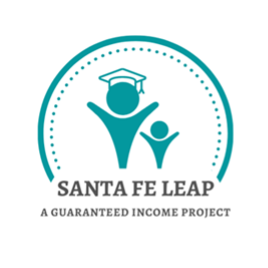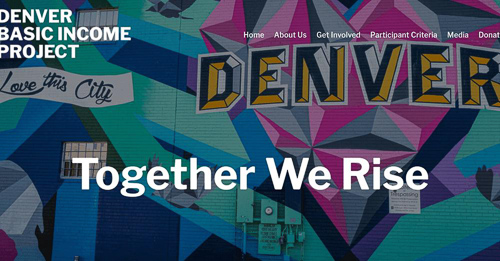
by Guest Contributor | Apr 14, 2022 | News
The sun isn’t the only thing shining this year in Santa Fe, New Mexico as for the first time in history, single parents who are enrolled in Santa Fe Community College receive basic income support funded through the Mayor’s for Guaranteed Income (MGI). The City of Santa Fe’s MGI Project, Santa Fe LEAP, paves the way toward community resiliency through safety net funding as low-income parents strive to meet their living expenses and educational goals.
According to the Institute for Women’s Policy Research, single mothers are more likely to live in poverty than other women at every educational rate. Single mothers in New Mexico who graduate with an associates degree are 35% less likely to live in poverty than a high school graduate. Direct benefits not only improve the lives of graduates but also impact the safety net budget. Single mothers who graduate with an associate degree save New Mexico $26,842 in public assistance spending over a lifetime. These benefits increase as women receive higher educational degrees. For example, single mothers in New Mexico who graduate with a bachelor’s degree are 59% less likely to live in poverty than high school graduates and save New Mexico $43,711 in public assistance spending over a lifetime.
In building momentum for the program, Santa Fe’s mayor Alan Webber, along with city councilors and staff members from Santa Fe Community College and its Foundation, launched the pilot program with funding through MGI. Eligible participants are between the ages of 18 and 30 and must be the primary care provider for a child under the age of 18. In addition, the student must have been enrolled in at least one class prior to Fall 2021, into a certificate or degree program and make less than 200% of the federal poverty rate. 100 single parents were randomly selected to receive the $400 monthly cash assistance via credit card or direct deposit. Although this pilot program is intended to last one-year, future goals are in place to increase the $400 monthly limit to $500 per month, with the hopes to last for an additional year. Gifts that go toward the Santa Fe MGI Project are 100% tax deductible and should be sent to the SFCC Foundation and directed to the MGI Project.
Education reporter Jessica Pollard interviewed nursing student Martina, who participates in the pilot program. Martina reported that her family does not qualify for government assistance, and they struggle to makes ends meet. Martina uses the monthly income toward her $500 car payment. Moreover, the City of Santa Fe’s Communication Director David Herndon stated that although data has yet been measured to provide information on the outcomes of the project, participants report not having to make choices between food or heating and have options that were not available before the project began. Herndon observed, “For instance, this buffer may allow participants to hire babysitters, so they are able to complete class work for college degrees.” Evaluation will be conducted by a team at the University of Pennsylvania, Center for Guaranteed Income Research as it is a part of MGI funding.
Santa Fe Mayor Alan Webber says: “We’re committed to helping our young working families have better lives. It’s wrong for a mom or dad to have to choose between getting an education and feeding their family. We’re giving these families the support they need to realize all the things an education can provide: more security, more stability and a lot less stress. This project makes Santa Fe a leader in a national movement for real progressive change.”
The Basic Income Pilot has been replicated in cities and towns across the country. Further movement in research and funding will help in reversing the cycle of poverty, building resiliency for those who struggle to make ends meet as they strive for brighter futures for their generations to come.
Miranda Queen and David Herndon, April 13, 2022

by Guest Contributor | Apr 12, 2022 | News
In Denver Colorado, a cash distribution program targeting those who experience homelessness is closing in on fully launching. The Denver Basic Income Project (DBIP) seeks to give a basic income to individuals to demonstrate that recipients of direct cash payments are more likely to obtain stable housing, gain more opportunity for stable employment, and empower people to assert their dignity and agency while improving their lives and improve the lives of those around them. The project aims to implement and study methods of building a healthier society, grounded in the values of social justice, anti-poverty, anti-oppression, and self-determination.
Some cash payments have already begun under a soft launch to understand where improvements can be made in the structure and implementation of the study. This approach aims to ensure that the program is as effective as it possibly can be over the 12-month span the full launch will cover. The Graduate School of Social Work at the University of Denver will be the organization conducting the study of results, and multiple organizations in Denver will be assisting in the implementation of the program.
Mark Donovan, the project founder, says “Direct cash payments move toward eliminating wealth inequality and begin to build a healthier community here in Denver and hopefully we’ll create a model for other cities to follow.” DBIP is itself modeled on two successful projects based in Vancouver, British Columbia, and Stockton, California. Both the New Leaf Project in Vancouver, and the SEED project in Stockton showed positive effects on the lives of participants. In comparison to what the United States has currently implemented to help these people, “Our society can do better” says Donovan.
The Mayor of Denver, Michael B. Hancock, is in partnership with DBIP through Mayors for a Guaranteed Income, a network of Mayors throughout the U.S. dedicated to advocating for a guaranteed income. “The Denver Basic Income Project is an opportunity to explore how the philanthropic community and the private sector can augment public support for those living in poverty, particularly our unhoused neighbors, and extend that hand up to stability” said Hancock. Mayor Hancock is concerned about a variety of issues such as homelessness, disparity in opportunity, and a withering middle class because of a lack of equity in economic systems.
There has been a large amount of fundraising for the project that continues. DBIP is still accepting donations towards its goal of securing 7.8 million dollars. DBIP is also currently applying the lessons learned from its initial soft launch and strengthening itself and its relationship with the community, especially leaders and participants from Black, Indigenous, and People of Color (BIPOC) communities. Everything points to DBIP being an extremely promising endeavor worth paying attention to.
If you would like to read more about the Denver Basic Income Project you can read a recent guest column written by Mark Donovan for The Pulse Institute here.
Aaron Lamb, April 11, 2022

by Guest Contributor | Apr 12, 2022 | News
On Wednesday, February 16th, 2022, Jane Hutt, the Minister for Social Justice, announced that a pilot of Basic Income will be launched in Wales in the 2022/2023 financial year. This program is focused on those leaving care at age 18. The goal of this pilot is to increase the support that is available to young adults and examine the impact that these financial resources have on young people leaving care. All young people leaving care who turn 18 years old within the initial 12-month period of the program will be considered eligible for the basic income pilot program across all local authority areas in Wales.
Those leaving care will receive a stipend of £1,600 a month for up to two years, with the first payment arriving one month after their 18th birthday. This amount, totaling £19,200 before tax annually, will be considered a source of income and taxed accordingly. These funds are given unconditionally, and participants will still be eligible for this funding even after they become employed. Officials say this amount is equivalent to the real living wage in the United Kingdom, and will help to provide a safety net for those leaving care who may not have support from their families.
The pilot will begin distributing funds in the summer of 2022, and it is estimated that over 500 young people will be eligible. This would cost up to £20 million over three years. Other forms of support will be offered to participants in addition to the monthly cash award of £1,600, such as financial wellbeing training and signposting to support services. This program will help experts determine the benefits of basic income, which include improving financial wellbeing and addressing poverty. This pilot will allow ministers to examine the effects of basic income programs and help those leaving care transition into independent adults by delivering financial stability.
A Technical Advisory Board has been assembled to monitor the progress and evaluate outcomes from this basic income program, chaired by Professor Sir Michael Marmot. In addition, an external reference group will be involved with this pilot to support the participants and provide representation on their behalf.
More information will be provided in the coming months.
Maria Matarazzo, April 11. 2022

by Guest Contributor | Apr 12, 2022 | News
In January 2022, 57 people began receiving unconditional direct deposit payments and on March 31st, 58 more people began receiving payments. The guaranteed income project in Gainesville, Florida, Just Income GNV, provides these payments to those who have been recently released from either a state or federal prison or a Florida county jail with a felony. Through a financial disbursement partner, Steady, participants received a one-time $1000 deposit followed by $600 monthly payments. Payments are received directly to a bank account or a prepaid card. The program is privately funded by Mayors for Guaranteed Income, Spring Point Partners, and donations. During onboarding, recipients were offered a benefits counselor through Southern Legal Counsel so that they could understand the potential impacts participation may have on other benefits.
Just Income GVN will be evaluated based on the level of effect a guaranteed income has on justice-impacted people. Using a mix-methods randomized controlled trial, Group A (Recipients) will receive the money and Group B (Allies) will not. The Center for Guaranteed Income Research (CGIR) at the University of Pennsylvania and Dr. Lucius Couloute, professor of sociology and criminal justice at Suffolk University, paired with the pilot program to evaluate the quantitative and qualitative data. They will specifically review the personal narratives, monitor spending, housing stability, and the relationship between income and recidivism.
The Program Director, Kevin Scott, explains that the largest barriers to launching the program were logistics and skepticism. The pilot program overcame logistical challenges throughout the process and learned a lot between the two separate cohorts. Skepticism, especially amongst formerly incarcerated people, presented as the belief that the program’s offerings were too good to be true. The target population of this particular pilot program is often marginalized and pushed beyond the outskirts of society. However, this project was designed by people formerly incarcerated and continues to be administered by those formerly incarcerated. This shared experience helped to build rapport and establish trust, overcoming much of the skepticism. Still, some of those who qualified did not pursue the benefits for themselves.
The project was undertaken by a nonprofit in Gainesville called Community Spring. The organization hires community members who have been impacted by poverty in order to better address the issue from an insider’s perspective. A need for resources around the release from incarceration were identified and a re-entry support group formed. Former prisoners began assisting those being released from prison, whether providing resources or emotional support.
When the Gainesville mayor joined Mayors for a Guaranteed Income, he went to Community Spring as a local nonprofit, offering the opportunity to implement a guaranteed income pilot. After careful consideration the group agreed to participate so long as the program could focus on people who have been formerly incarcerated.
An immediate difference could be seen in recipients’ lives within the first few months of payments. Recipients were and are paying off legal fees and investing in education and transportation. One recipient was able to buy a scooter at a thrift store and another was able to make payments to save his family home. The impact thus far has been extremely positive. The program’s organizers are excited to be a part of the research on guaranteed income and believe the data is compelling and could potentially lead to broader application.
Meagan Merritt, April 11th, 2022

by Guest Contributor | Apr 9, 2022 | Opinion
Which country in the world arguably needs a Basic Income most?
Singapore, because she has the highest reserves per capita in the world, is in the top five for per capita income in the world, the fifth most expensive city in the world (The Economist) – and yet Singapore has no minimum wage, the greatest inequality amongst developed countries (Gini coefficient before government transfers), the biggest wage gap between the top and bottom percentiles, the lowest social welfare spending among developed countries, most expensive public housing in the world (price to income ratio), highest national pension contribution rates in the world (typically up to 37 percent of income), one of the most expensive electricity, water, public transport, public universities’ tuition fees, etc, in the world.
In addition to the above, Singapore has a unique fiscal policy (from a cash flow perspective) of limited spending on the nation’s pension scheme, public housing, and healthcare. However, the annual inflows exceed the outflows in each of these three areas, currently and historically.
Some recent statistics (April 2022) demonstrate that 10 percent of households cannot pay their water bills (media reports), and 10 percent of households do not have enough money to eat nutritionally (2019 pre-Covid-19, SMU-Lien Foundation Hunger Report 2019), etc.
So, perhaps in the final analysis – without Basic Income – many Singaporeans may have to continue to struggle to make ends meet. At the same time, Singapore has one of the highest per-capita suicide rates in the world, in spite of it being a criminal offense to attempt to try to kill oneself!
Singapore’s Reserves are estimated to be $1.97 trillion. If this is the case, perhaps it is time Singapore considers a basic income and shares this wealth with the people.
Written by: Leong Sze Hian






